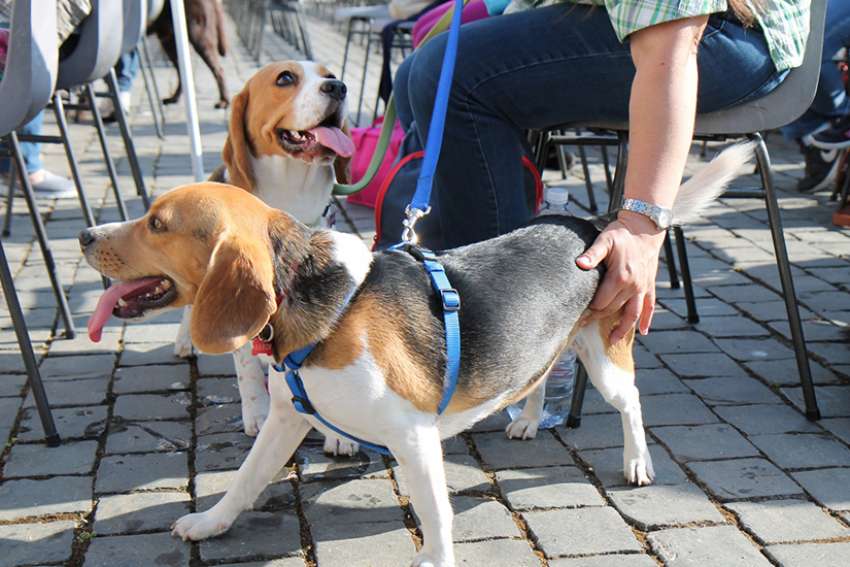From a Texan saving a dog as it clung to a guardrail at the side of a flooded highway to a Houston woman who spent 14 hours in her attic with 21 dogs — four her own, 17 left behind by neighbours — until rescued by a couple of Good Samaritans in a boat, these testaments of canine love unfolded in real-time across social media.
Canadians also love our dogs (and cats). Hockey may be Canada’s national pastime, but pets have become our national obsession. In recent years, they’ve become increasingly important to us, likely a result of the growing number of single-person households, an aging population, and couples marrying and having children later in life.
The Catechism of the Catholic Church tells us that “animals are God’s creatures and He surrounds them with his providential care. By their mere existence, they bless Him and give Him glory. Thus, men owe them kindness.”
And kindness we definitely show them. According to a Canada-wide survey commissioned by the Canadian Animal Health Institute, pet ownership is on the rise. Figures released at the beginning of this year report that 7.6 million dogs (up from 6.4 million in 2014) and 8.8 million household cats (up from an estimated seven million) are considered pets.
But pet love is nothing new. What has changed the conversation in recent years is the copious amount of research on the ways in which our relationship with dogs and cats is improving our mental and physical health. This is why “pet therapy” has become so common at hospitals, long-term care homes, universities and even in some workplaces. This September the Toronto courts welcomed their first facility dog, Iggy, to comfort traumatized children through court appearances.
Much research has shown that our four-legged friends can help decrease anxiety, loneliness and depression, and help prevent and treat a wide range of physical maladies, such as heart disease, asthma and obesity.
Growing up with two dogs that lasted a combined total of 28 years — Blackie, a rough and tumble German Shepherd and Labrador Retriever mix with a penchant for running away, followed by Stella, a Siberian Husky with a big personality and a knack for catching unsuspecting birds which had the misfortune of entering her radius — I always had unfettered access to unconditional animal love.
These companions ushered me through growing pains, from awkward teenage years and rotating friends to heartbreak and career transitions. No matter how bad your day, a snuggle with your judgment-free dog somehow makes you feel everything is going to be all right. Little did I know back then that something as simple as petting your dog can increase levels in your brain of the feel-good hormone oxytocin and lower production of the stress-inducing hormone cortisol.
But now comes research, released last month, that counters the widely held belief that pets and improved health necessarily go hand-in-hand. Scientists at the U.S.-based RAND Corporation, a research organization that “develops solutions to public policy challenges to help make communities throughout the world safer and more secure, healthier and more prosperous,” found that pet ownership itself doesn’t actually make people healthier. It’s having the means to own a pet that makes a difference.
“While the (cat and dog) owners studied appeared healthier than people without pets, the difference went away when the researchers factored in that owners were likely to be healthy for other reasons, mostly bearing on socioeconomic status,” reported The Atlantic, whose reporter also clarified that the biostatician interviewed said the group of researchers “loves pets” (as he probed for any signs of anti-pet bias).
Among key factors: Pet owners are more likely than non-pet owners to be employed full-time, have higher household income and live in a house. Therefore, while it might seem that superior health comes from interacting with a pet, researchers concluded that a more likely explanation is living a comfortable lifestyle.
It’s an interesting finding. If it is in fact true, I count myself lucky to have been raised in the conditions that allowed me to grow up in the company of pets.
But research comes and goes — and with a million and one variables changed, different hypotheses are produced. This report concluded that more research is needed to prove the health-link. Perhaps, but I’m not holding my breath in anticipation of it.
Pet lovers already know the benefits and blessings they experience firsthand everyday through the unconditional love of their furry companions, quantifiable or not.
Then again, maybe I’m just a dog lady.
(Santilli-Raimondo is a communications co-ordinator in the Office of Public Relations and Communications at the Archdiocese of Toronto.)
First published in The Catholic Register's October 1st, 2017 print issue.


